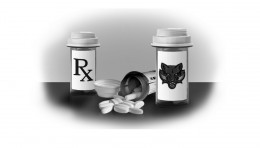
On Tuesday, Donald Nieman, provost and vice president of academic affairs, announced that Binghamton University is studying the feasibility of creating a pharmacy school. While the plan is still in its early phases and its downsides are accordingly sparse, the project does hold promise.
The idea to construct a pharmacy school seems to have been adopted in lieu of the construction of a law school. That plan, tossed around for a few years before being abandoned last year, aimed at the same goals as this proposal: the expansion of specialized fields within the University and more importantly, the bolstering of BU’s brand.
In many ways, a pharmacy school makes a lot more sense than a law school in both regards. First, there’s the sheer number of law schools across New York state — 15 — and within the SUNY system — five at present. Contrast that to the supply of pharmacy schools: seven in the state, and one within the SUNY system. Starting a law school, then making it competitive enough to attract top students and professors, then, would be a long, uphill battle. A pharmacy school, on the other hand, would enter a field that is begging for more options.
That’s not to say that a pharmacy school would be an immediate and smashing success. It would take time. But whereas a mediocre law school would be a deadweight on Binghamton, encumbering growth, tying up funds and diverting attention away from other important projects — all with a slim chance of making the school substantially more competitive and a significant chance of actually hurting the University’s reputation — a pharmacy school holds the promise of increasing undergrad research and employment opportunities as well as making Binghamton’s name that much better.
For undergrads in the pre-med field — particularly the neuroscience field, a fast-growing major here — this proposal should be of great interest. A pharmacy school would not only provide them with expanded undergraduate opportunities by allowing them to take part in research programs; it would also open up to them the opportunity to pursue graduate education at a cheaper cost and speedier rate. The former comes in the form of the SUNY system — a state pharmacy school will be cheaper than a private one — and the latter through the accelerated pharmacological track that will be offered to Binghamton students — a five or six-year unified program instead of four years of undergrad followed by another four of grad school.
We should hear a final decision on the prospects of a pharmacy school by September. Barring some prohibitively high cost or the sudden construction of pharmacy schools across the state, we fully stand behind the construction of a pharmacy school. It benefits undergrads and promises to impel Binghamton further along the path to being recognized as not just a cost-efficient school, but a top-tier university.


